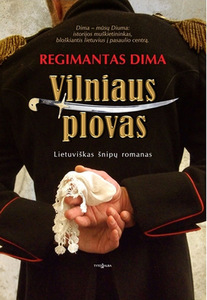Neither pilaf, nor spies 5
In brief: It is neither a historical, nor spy, nor detective nor even a novel. When reading "Vilnius Pilaf" (Vilniaus plovas, 2015, Vilnius: Tyto Alba) I felt as if I was talking to my grandfather. After noticing that someone is listening to him at least partially, he would start telling stories. Since I did not know his friends he would tell me everything about them, sometimes would pause to enjoy the memory and then continue telling.
I started reading Regimantas Dima in the social networks, where he writes under the nickname of Observer of life. He continues telling short stories there about the everyday life, oppression of a Balkan woman, adventures of his daughter and dog. Apparently, after Dima felt he is capable of creating an attractive, funny and lively short form he decided to tackle a large pile of pages. As he said, of the historical novel "Vilnius Pilaf."
In one of the many interviews R. Dima said that the story is beautiful and the account of the Big Game between two empires is as complex, rich and delicious as a well-cooked real pilaf. Probably even so, but then the author over bragged saying he knows how to cook the pilaf.
As we have seen in numerous reviews, I will repeat again that there is no Vilnius in the book. Sure, main characters Tomas Zanas and Jonas Prosperas Vitkevičius has connections with it, but only as university students and all the other action takes place far away in Asia, Orenburg or St. Petersburg. Thus, the pilaf is certainly not of Vilnius.
Although Dima has collected such a great amount of, no doubt, interesting, less-known and potentially very fruitful material, it seems to have been in vain.
Although, we are provided with so much material, characters are real historical persons (although, I doubt there was a need to expand most of their stories so much), the Big Game is also real - this is not a historical novel.
Then is it a spy novel? But no spies can be seen. Throughout the entire story, maybe a dozen times it is mentioned what great intrigue was created by those Lithuanian lags, how cleverly they played the two empires so they could create an opportunity to free Lithuania, but that intrigue, that spying cannot be found anywhere in the book.
Is it a detective then? Not really. It seems that there had been an attempt to start a detective line with Sigitas story, how he accidentally learns about Lithuanians, who created a conspiracy in Asia, about valuable documents, about how he decides to get those documents and how dangerous that is. But all that is lost among the many presentations of one-page characters and admiration of one's history knowledge.









